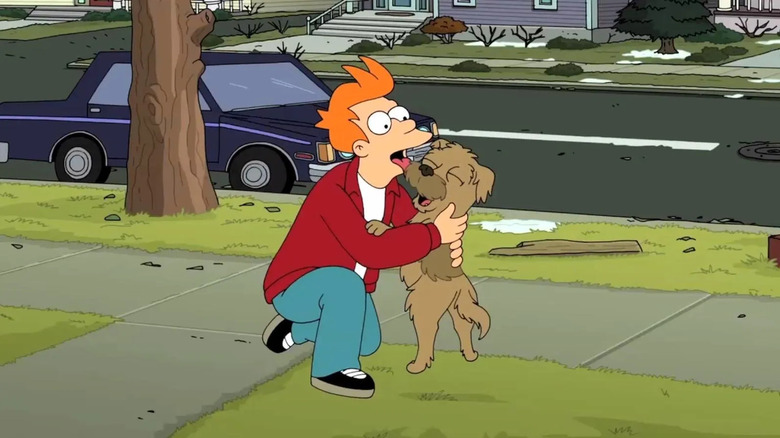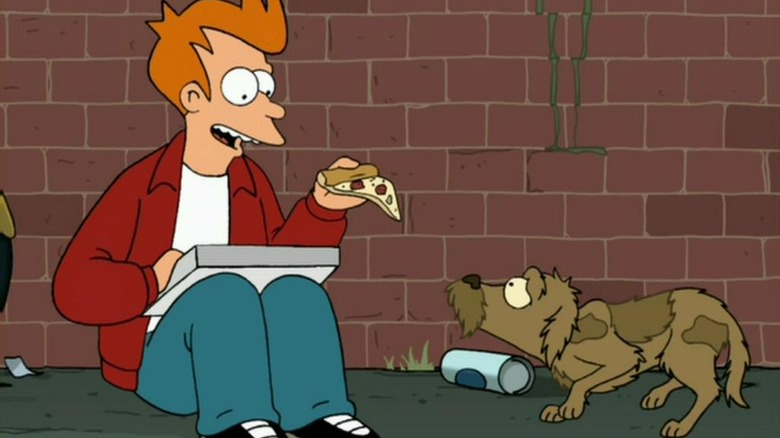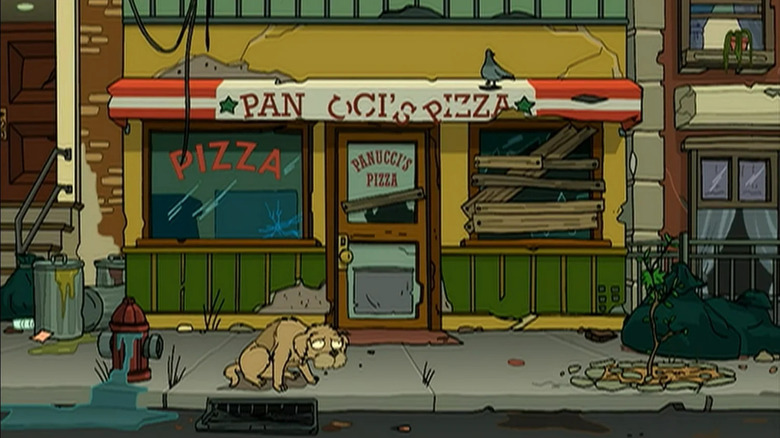Futurama's Maurice LaMarche Has A Hard Time Revisiting One Particular Episode
Voice actor Maurice LaMarche is one of the preeminent elder statesmen of his craft. He started his career in stand up, finding he was a talented mimic, moving into animation in 1980. He appeared in hit shows like "Inspector Gadget" and "Transformers," really hitting his stride in 1985 playing Ego Spengler in "The Real Ghostbusters." He cycled through the KidsWB canon aggressively in the late '80s and early '90s, appearing in "Taz-Mania," "Batman: The Animated Series," "Tiny Toon Adventures," "Freakazoid!," and "Animaniacs" wherein he employed his spot-on Orson Welles impersonation to voice the power-hungry mouse the Brain. His largest sampling of voice caricatures came from his work on the 1994 series "The Critic," where he voiced celebrities ranging from William Shatner to Elizabeth Taylor (but only when she was belching).
In 1999, LaMarche became one of the regulars on Mat Groening's and David X. Cohen's sci-fi sitcom "Futurama" where he played Kif, Calculon, Lrrr, Morbo, Horrible Gelatinous Blob, the headless body of Spiro T. Agnew, and many others. He has been a regular on "Futurama" through the show's many notorious cancellations and resurrections, remaining loyal to the series.
As of this writing, there have been 150 episodes of "Futurama" from its debut in 1999, a number that includes four feature-length straight-to-DVD movies that are sliced into four episodes for broadcast. Of those 150, LaMarche knows his favorite. Although he admitted to being so moved by his favorite that he can't rewatch it often. Talking to the Pop Break, LaMarche admitted that his favorite episode was "Jurassic Bark" (November 17, 2002). That's the one about Fry's long-lost dog Seymour, and one that features a heart-wrenching ending for dog owners everywhere.
'Jurassic Bark'
In "Jurassic Bark," Fry (Billy West) goes to a 31st-century museum of ancient artifacts, only to see ephemera excavated from the long-buried Panucci's Pizza, his place of employment from back before he was cryogenically frozen. Among the bric-a-brac are the fossilized remains of Seymour, his beloved dog. Fry eventually reclaims his dog's remains only to learn that, according to the Professor (West), Seymour was "fast fossilized," meaning he can be cloned and brought back to life with all his memories intact. Through this process, audiences see flashbacks to 1999 wherein Fry bonded with Seymour. Fry taught the dog to bark "Walking on Sunshine" and Seymour eventually became the poor dope's only true friend. Fry left Seymour behind when he was cryogenically frozen.
The episode ends when Fry learns that Seymour lived for many years before becoming fast-fossilized. Fry reasons that Seymour lived a long full life without him, and elects to not resurrect his dog after all. The epilogue features a montage, set throughout the early 2000s, depicting Seymour waiting for the frozen Fry to return to Panucci's ... for years. Seymour waited back on the sidewalk, hoping Fry would come home. The last shot is of Seymour lying down on the sidewalk to die, tragically never reunited with his best friend.
Of the episode, LaMarche said:
"I've only been able to watch it once. I call it a favorite, but I can't revisit it because I'm a mess. I was a mess at the end of the episode. I cried at the table-read with the description of what was going to happen. I'm sitting there — and there's no animation, we're just reading the thing cool — and when David [X. Cohen] reads what happens when Seymour's waiting at the ... I can barely discuss it without crying."
The sad episodes
LaMarche admitted that he prefers the emotional, tragic episodes of "Futurama" over the wacky or comedic ones, or even the episodes that feature him prominently. He also mentioned one of his favorites was "Luck of the Fryrish" (March 11, 2001) an episode that flashes back to Fry's childhood and the relationship he had with his brother Yancy (Tom Kenny). Fry found ancient monuments in the 31st century devoted to Philip J. Fry — which is his full name. The monuments, however, bear his brother's face, leading Fry to assume his brother usurped his name. We later learn that the monuments are actually to Yancy's grown son — whom he named after his brother.
LaMarche connected with the episode because, well, it reminded him of his own family. He could relate. LaMarche doesn't play a major role in "The Luck of the Fryrish." He just loved the writing. He said:
"'The Luck of the Fryrish' never fails to bring a tear to the eye. I have brothers, I know what that kind of love is like. There's always a bit of conflict to it because it's like a best friend you'd never pick for yourself and I love both my brothers very, very dearly. [...] And oddly enough, those are my favorites and I'm barely in those episodes. In fact, I don't even appear in 'Luck of the Fryrish.' Those are my favorites and I think they're big fan faves."
LaMarche also noted a more recent episode, whose title he declines to say as it hadn't aired yet, about Dr. Zoidberg (West) that was equally emotional.
One might assume that, in not choosing his own performances, that LaMarche is just being modest.


